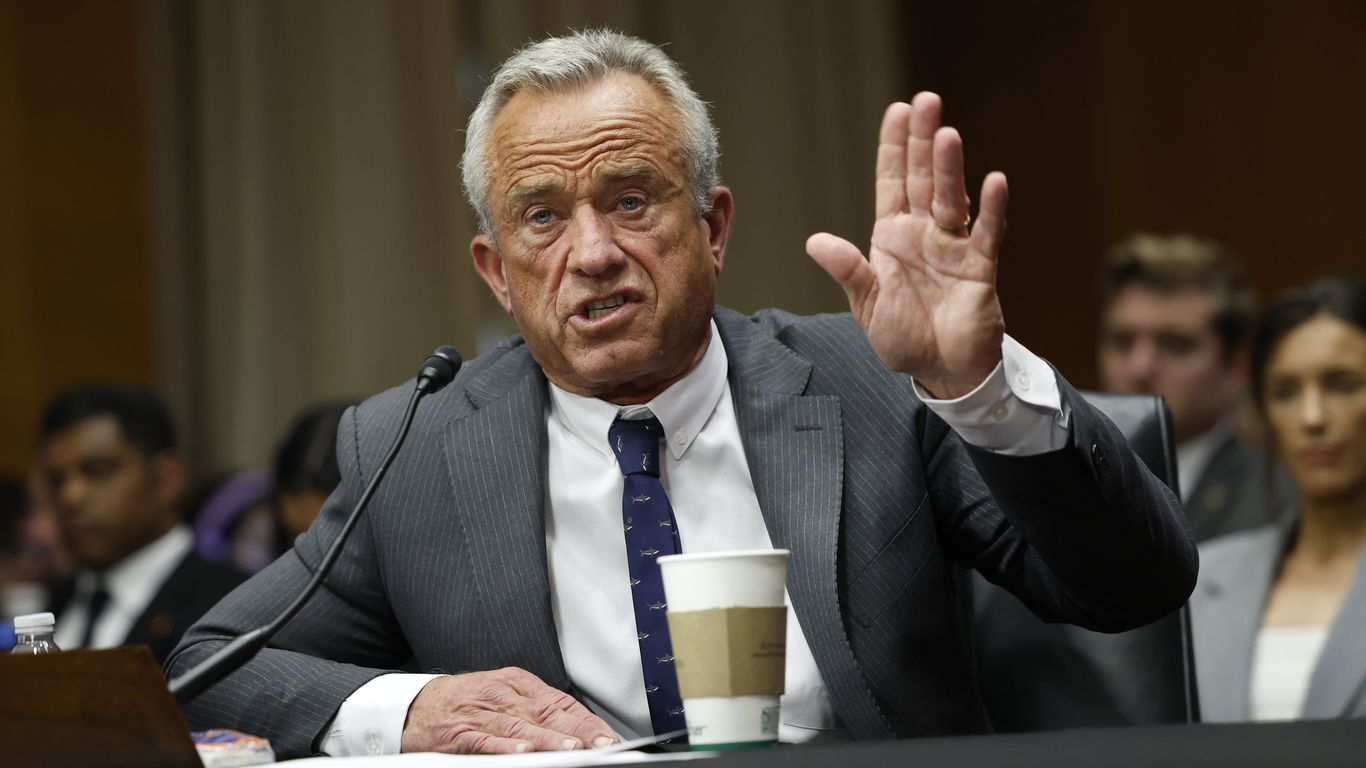Health and Human Services Secretary Robert F. Kennedy Jr. advocated for the measles, mumps and rubella (MMR) vaccine during a visit to West Texas on Sunday to comfort two families whose children died of the disease.
Why it matters: Kennedy has been criticized for downplaying measles risks and the efficacy of vaccines, notes Axios' Marc Caputo, who first reported on the secretary's visit to Texas.The secretary has a long record of sowing skepticism about vaccines.Driving the news: Both children in Gaines County were not vaccinated when they died of measles, according to the Texas Department of State Health Services.

Texas has the largest number of reported measles cases in the U.S. Kennedy wrote on X Sunday that 499 of the 642 confirmed cases in 22 states were in Texas.
What he's saying: Kennedy said on X Sunday he's visiting Gaines County, Texas, to "quietly to console the families and to be with the community in their moment of grief."He said he's also there to support Texas health officials and to learn how our HHS agencies "can better partner with them to control the measles outbreak."Kennedy pointed to the deployment of a CDC team "to bolster local and state capacity for response across multiple Texas regions, supply pharmacies and Texas run clinics with needed MMR vaccines and other medicines and medical supplies," among other measures he said he'd taken.
"Since that time, the growth rates for new cases and hospitalizations have flattened," Kennedy said. "The most effective way to prevent the spread of measles is the MMR vaccine."Flashback: In the face of criticism of his handling of the federal response to the outbreak, Kennedy wrote an op-ed for Fox News Digital last month with the headline "Measles outbreak is call to action for all of us" and the subheading "MMR vaccine is crucial to avoiding potentially deadly disease.
"In the article, Kennedy wrote "Vaccines not only protect individual children from measles, but also contribute to community immunity, protecting those who are unable to be vaccinated due to medical reasons," but said the decision to vaccinate is "a personal one."Go deeper: White House fed up with RFK Jr.'s sluggish press shop.
RFK says the "most effective way" to prevent measles spread is the MMR vaccine

Health and Human Services Secretary Robert F. Kennedy Jr. advocated for the measles, mumps and rubella (MMR) vaccine during a visit to West Texas on Sunday to comfort two families whose children died of the disease.Why it matters: Kennedy has been criticized for downplaying measles risks and the efficacy of vaccines, notes Axios' Marc Caputo, who first reported on the secretary's visit to Texas.The secretary has a long record of sowing skepticism about vaccines.Driving the news: Both children in Gaines County were not vaccinated when they died of measles, according to the Texas Department of State Health Services.Texas has the largest number of reported measles cases in the U.S. Kennedy wrote on X Sunday that 499 of the 642 confirmed cases in 22 states were in Texas.What he's saying: Kennedy said on X Sunday he's visiting Gaines County, Texas, to "quietly to console the families and to be with the community in their moment of grief."He said he's also there to support Texas health officials and to learn how our HHS agencies "can better partner with them to control the measles outbreak."Kennedy pointed to the deployment of a CDC team "to bolster local and state capacity for response across multiple Texas regions, supply pharmacies and Texas run clinics with needed MMR vaccines and other medicines and medical supplies," among other measures he said he'd taken."Since that time, the growth rates for new cases and hospitalizations have flattened," Kennedy said. "The most effective way to prevent the spread of measles is the MMR vaccine."Flashback: In the face of criticism of his handling of the federal response to the outbreak, Kennedy wrote an op-ed for Fox News Digital last month with the headline "Measles outbreak is call to action for all of us" and the subheading "MMR vaccine is crucial to avoiding potentially deadly disease."In the article, Kennedy wrote "Vaccines not only protect individual children from measles, but also contribute to community immunity, protecting those who are unable to be vaccinated due to medical reasons," but said the decision to vaccinate is "a personal one."Go deeper: White House fed up with RFK Jr.'s sluggish press shop














